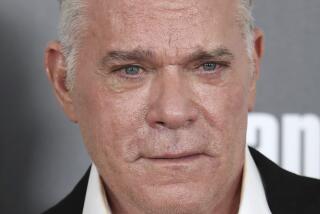Keeping order, from the first page to last
Barbara Stoia
Script supervisor
Current credit: USA’s “Law & Order: Criminal Intent.”
Previous credits: “The Equalizer,” “Q&A;,” “The Bone Collector”
Job description: “A script supervisor is often referred to as continuity because a film or a television show more often than not is shot out of sequence. There are certain plot points and certain performance aspects that have to be kept consistent. You may shoot part of a scene one day and not finish the scene until two days later. Or people may be inside a restaurant and you’ll shoot that part one day and then two days later you shoot them coming out of the restaurant. Among other responsibilities, a script supervisor has to make sure the order of when the people left the restaurant, who was laughing, who was crying, what their wardrobe looked like in terms of buttons, coats and gloves.”
Playing the angles: “Within a scene you shoot many angles, and what a script supervisor has to do is keep the dialogue and action consistent so that when the editor cuts together, going from a wide shot to a two shot to a close-up to a two shot to a wide shot, the actors are indeed looking in the same screen direction they should be, saying the right line, so that the splicing together of the different angles remains consistent in terms of its look. That is again literally done by notation, and hopefully after a number of years there are certain things you can file away into the proper part of your brain, so you go, ‘That doesn’t look right. They should be doing it this way.’ ”
Process: “You have to break down the script, everything from reading it out loud to yourself to assigning a timing with a stopwatch for each scene so you have an idea of how long each scene runs. This tends to be very important in episodic TV because sometimes you get a script that’s long and you need to tell them that before you start shooting, so maybe they have cut some dialogue or some scenes because you certainly don’t want to have to keep spending money shooting footage you know they aren’t going to be able to use. Sometimes, though it’s much more rare, the script will come out short, so you may want to insert a few extra scenes. You also go through the script with little Magic Markers because basically what a script supervisor is doing is being a double-check system for several other departments. You are helping out the prop department, the wardrobe department, the actors in the sense that you keep track of dialogue, and if they happen to [forget] a line you can feed it to them. You’re helping out the camera guys because you want to keep the screen direction consistent.”
Script changes: “In features, dialogue is changed all the time. Of course, a script supervisor has in his or her mind the overall continuity of the script. So let’s say that it’s already been established that a character has done a certain thing and you are shooting another scene and the director or the writer or the actor wants to change the dialogue and that will make inconsistent something that has already been shot. It is up to the script supervisor to say. I can interrupt and say we’ve already shot or visually established that this is a particular existing fact, or you can say, ‘Well, this has been established. If you want to change the dialogue here, then we will either have to reshoot the scene or [make changes] somewhere in the looping, the post-production dialogue replacement we’ve already shot.’ ”
Braving the elements: “The most challenging thing is to wrap yourself in the appropriate outer wear, which tends to be a little bulky, and you are sitting there by the video monitors and you are not just making little notes on your script that have to deal with matching action and dialogue, but you are also making copious notes for the editor. You are marking up the script in terms of telling the editor which shot covers what part of the dialogue or action in the script. And you are making a log of notes of how many takes we have done of each shot.”
Family business: “My mom, Renata Stoia, actually was indeed a script supervisor in New York. Basically, what is interesting is that I grew up like many baby boomers, nuts about TV and nuts about movies, and I was actually fortunate enough to have a mom who was a script supervisor. . . . I would go on the set with her and see what she did, and I really liked the fact that someone would have to talk to the script supervisor at some point, so you were very much part of the collaborative process. I was the first daughter of a script supervisor on the East Coast to become a script supervisor. I trained with Renata -- you really can’t learn what a script supervisor does unless you literally sit on a set with the script supervisor.”
Resides in: New York City
Union or guild: IATSE, Local 161.
Age: “I prefer not to say because I know what this industry is like. I think people will be able to figure out that I am no particular spring chicken but not yet past my total prime.”
-- Susan King
More to Read
Only good movies
Get the Indie Focus newsletter, Mark Olsen's weekly guide to the world of cinema.
You may occasionally receive promotional content from the Los Angeles Times.







